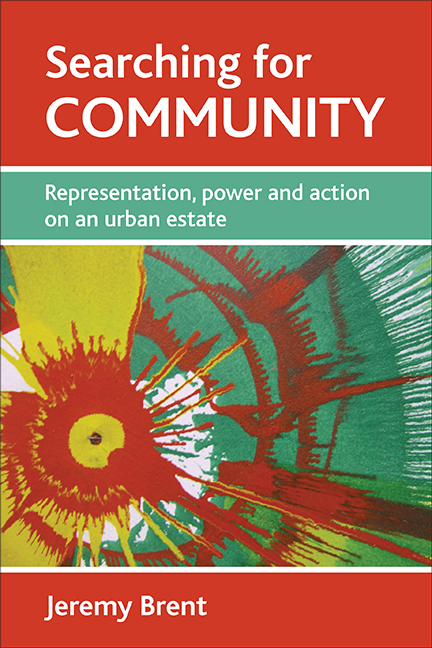Book contents
- Frontmatter
- Contents
- Foreword
- Notes on the author
- Introduction
- one Four settings: contexts and questions
- two Researching Southmead: problems of representation and participation
- three The intelligent outsider? Official and media representations of Southmead
- four Knowledge from within: community art and local representations
- five The outsider within: crossing worlds
- six Young people and community: trouble and tribes
- seven Four examples of community action in Southmead
- eight What is community anyway?
- nine Engaging with community
- ten Communicating what youth work achieves: the smile and the arch
- Author’s acknowledgements
- Epilogue: Southmead eight years on
- Afterword: Why Jeremy Brent’s work is more relevant than ever
- Bibliography
- Index
five - The outsider within: crossing worlds
Published online by Cambridge University Press: 22 January 2022
- Frontmatter
- Contents
- Foreword
- Notes on the author
- Introduction
- one Four settings: contexts and questions
- two Researching Southmead: problems of representation and participation
- three The intelligent outsider? Official and media representations of Southmead
- four Knowledge from within: community art and local representations
- five The outsider within: crossing worlds
- six Young people and community: trouble and tribes
- seven Four examples of community action in Southmead
- eight What is community anyway?
- nine Engaging with community
- ten Communicating what youth work achieves: the smile and the arch
- Author’s acknowledgements
- Epilogue: Southmead eight years on
- Afterword: Why Jeremy Brent’s work is more relevant than ever
- Bibliography
- Index
Summary
Introduction
Chapters Three and Four have investigated two points of view of Southmead: the view from without, the ‘master’s’ position; and that from within, the ‘subordinate’ position. These standpoints impose a dualism on knowledge of the area. This chapter involves looking at Southmead from positions that cross between being within and without and question that dualism. The position of black women working as domestics in white households has been described by Collins as ‘a curious outsider-within stance, a peculiar marginality’. I have translated this idea to describe my own situation, the very different and more privileged position of public servant working in Southmead.
The idea of standpoints as distinct and separate is difficult to sustain. The knowledges from outside have strong, almost solid themes, but their pathologisation of Southmead can be better described as a force, in the way they affect Southmead, than as an immobile stand. The relationship of those knowledges to Southmead is more complex than one of distortion, a relationship that would imply the existence of an undistorted, independent reality; these knowledges are in themselves a major part of the creation of the ‘reality’ of Southmead. The effect of power, as Foucault points out, is not to distort objects (such as Southmead), but to produce them, and the truths by which they are judged, a far more active relationship: ‘Power produces; it produces reality; it produces domains of objects and rituals of truth’.
The inside knowledges, in their complex, fragmentary and fluid way, are profoundly affected by their relationship with this created reality, a relationship they cannot escape. The two sets of knowledges are not autonomous stands, but exist in an interlinked relationship; any idea of Southmead as a bounded entity with an inside and an outside is constructed through powerful forces of social thought accepted by both standpoints, even as they differ on the contents. Outside viewpoints create Southmead as object rather than subject; insider viewpoints assert humanity and existence as subjects. Ideas of Southmead as a unitary object are confounded by the disputes that these arouse. Anthony Cohen describes this process thus: ‘The boundary as the community's public face is symbolically simple; but, as an object of internal discourse it is symbolically complex’.
- Type
- Chapter
- Information
- Searching for CommunityRepresentation, Power and Action on an Urban Estate, pp. 127 - 148Publisher: Bristol University PressPrint publication year: 2009



